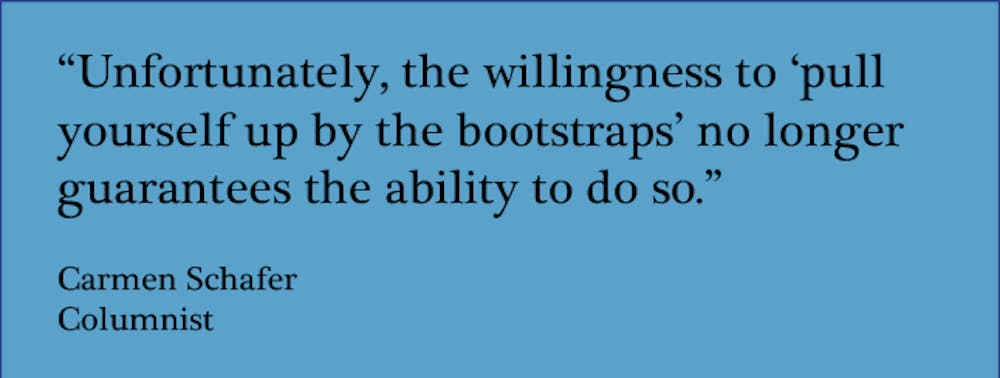
Despite living in “Seattle” all my life, in truth, there has always been a body of water separating me from authenticity. My hometown of Mercer Island, a suburb a few miles east of the Emerald City, is notorious for its culture of affluence — my preferred euphemism for snobbery.
In my first week at Island Park Elementary, I was introduced to luxury athleisure: “You don’t know what Lululemon is?” my fourth-grade classmate asked in disbelief. “Everyone in the world knows what Lululemon is!” she exclaimed.
As obnoxious as that may sound, in her defense, a world adorned in Lululemon was the only world she had ever known. And for the next eight years, her world became my world.
A world where students mock their teachers’ salaries during class. A world where the staff parking lot is lined with Subarus and Toyotas, while the student lot is crammed full of Lexuses and Range Rovers. A world where my economics teacher once taught a student who missed class once every six weeks to fly down to L.A. for a haircut.
If not for Hopkins, I would have attended the University of Southern California (USC), otherwise known as the University of Spoiled Children. Though Hopkins is not branded with that sort of reputation, according to data published by the New York Times, Hopkins actually has a higher ratio of students from the top one percent to students from the bottom 60 percent than USC has.
We may not attend the University of Spoiled Children, but we still attend a university with no shortage of spoiled children. The composition of our student body, much like that of every elite institution in the United States, is symptomatic of something bigger: the Myth of Meritocracy.
“Roughly one in four of the richest students attend an elite college — universities that typically cluster toward the top of annual rankings,” says the New York Times study. “In contrast, less than one-half of 1 percent of children from the bottom fifth of American families attend an elite college; less than half attend any college at all.”
Are the offspring of the wealthy naturally smarter than other children? Not necessarily, which is why we must turn our attention to nurture rather than nature.
According to a psychological study conducted at Stanford University that analyzed the language processing skills and vocabularies of children from different socioeconomic backgrounds, by three years old, “the children they observed from advantaged families had heard 30 million more words directed to them than those growing up in poverty, a stunning difference that predicted important long-term outcomes.”
Of course, the abundance of wealthy students at elite colleges can be in part explained by their ability to afford the astronomically high tuition in the first place. However, it would also make sense that whether one attends an elite college, let alone college at all, has a lot to do with the circumstances associated with “the language gap” and its “long-term outcomes.”
It’s been said that the apple doesn’t fall too far from the tree. How this idiom is relevant to this discussion was brought to my attention by my high school accounting teacher, who previously taught in a low-income school district in the actual city of Seattle.
High-achieving parents tend to raise children with similar aspirations. My classmates and I dreamed of becoming doctors and lawyers and attending prestigious colleges because we were surrounded by doctors and lawyers and Ivy League alumni.
Even though my parents were none of these things, my classmates’ parents were all of these things. As a result, based on the hand of cards we did not choose but life kindly gifted us with, we were destined to not only inherit high-achieving dreams, but also to live them. With the assistance of private tutoring, college counselors and no obligations other than getting into a good college, our dreams were never out of reach.
For students from disadvantaged backgrounds, there is no abundance of doctors and lawyers and Ivy League graduates there to instill such lofty ambitions in them. Their resources are not limitless. At age three, their linguistic development may already be behind that of their advantaged counterparts.
So at the end of the school year, when my accounting teacher congratulated me on getting into Hopkins, I didn’t let myself feel too great about it. I was given every resource I needed to succeed. Sure, I tried in school, but if I hadn’t already been given the optimal hand of cards to begin with, my effort may have amounted to nothing.
The American Dream assumes a meritocratic society. While it does not guarantee equality of results, its existence is dependent on equality of opportunity. But what happens when there is no longer equality of opportunity? The achievement gap. A lack of social mobility. Rising socioeconomic inequality. The absence of equality of opportunity has killed the American Dream and made meritocracy a myth.
Unfortunately, the willingness to “pull yourself up by the bootstraps” no longer guarantees the ability to do so. It’s one thing to insist that life is unfair. It’s another to insist that we can’t do anything about it.





